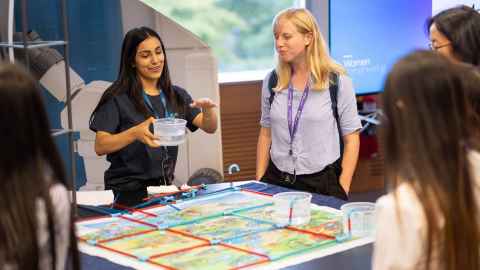How and why the Faculty of Engineering is appealing to the girls
26 March 2019
The Faculty of Engineering wants to increase the number of women studying engineering at the University of Auckland from 27% to 33%, and it has recently developed several industry partnerships to help it do so.

The Faculty of Engineering wants to increase the number of women studying engineering at the University of Auckland from 27% to 33%, and has recently developed several industry partnerships to help it achieve the goal.
Companies that have come on board include Tonkin+Taylor, Mercury, and Fisher & Paykel Healthcare. Representatives from each of the companies attended a formal launch of the strategy at the Faculty last week, where they spoke about how keen they were to support the campaign, and why.
Laurence Gulliver, General Manager of Non-Invasive Ventilation at Fisher & Paykel said the company’s CEO, Lewis Gradon, reckons it took him seven seconds to decide to support the campaign, after receiving an email from Professor Nic Smith, Dean of Engineering. “And I wouldn’t accuse our CEO of exaggerating,” Mr Gulliver quipped.
He described the company’s decision to support the 33% strategy as “just making sense”. The company makes medical devices to support the health needs of a diverse range of people, so diversity of thought was crucial to the success of the company. “And I have no doubt that gender diversity is an important part of that,” he said.
Professor Rosalind Archer, Head of the Department of Engineering Science and one of champions of the project was overseas at the time of the launch, but spoke via video.
“This is a really exciting project for me, and a real landmark in our faculty. It represents the faculty being brave, and tackling something difficult - to try to change the demographic of who will be the engineers of the future in New Zealand, who will be tackling the complex challenges that our country and our world faces.”
The partnerships will help support the Outreach programmes the Faculty has developed to encourage more girls to consider an engineering career.
This includes a tutoring programme the Faculty initiated last year, to help girls studying STEM subjects prepare for their NCEA exams. It also includes the development of activities designed by 3rd and 4th year engineering students, aimed at schoolchildren, which brings the principles of engineering to life in fun and playful ways, and also connects to what the students would be learning in school.
A group of WEN (Women in Engineering Network) students will be taking these activities out to schools throughout New Zealand.
It’s important that women engineering students get in front of school children, particularly the girls, says WEN member Jenna Kumar, who is studying software engineering.
“I think a major factor, of why more women don’t choose engineering, is that they don’t quite understand the variety of careers that engineering can lead to.
“Only by going to classrooms and showing students the various disciplines within engineering, can we widen their perception of what being an engineer is like, beyond the stereotypes. Also it is important for girls to be exposed to women engineering students, as it normalises the idea of women engineers.”
Several of these activities were showcased at the campaign launch. This included “Spheros”, a game which involves using an app to make a sphero (a small robot) move through the course on the mat – or have a sphero race with friends.
The “Aqualibrium” was also on display, in which participants create a network from pipes of different diameters, in order to fill three containers at the same rate from a single water supply.
Also showcased were the “Makeblock Inventor Electronic Kits” with which students can build their own electronic systems, such as a smart fan, burglary alarm or disco light, and programme them through a micro-controller on the Makeblock app.
Mr Gulliver noted that when he studied Mechanical Engineering at the University of Auckland there were only five women in his class, and he has since worked with most of them. He also said that for the first time last year, the company’s graduate intake was 50% women.
Achieving that 50/50 split wasn’t a conscious decision though. “That figure was the result of matching the talent to the opportunities.”
Media queries
Margo White I Media adviser
DDI 09 923 5504
Mob 021 926 408
Email margo.white@auckland.ac.nz